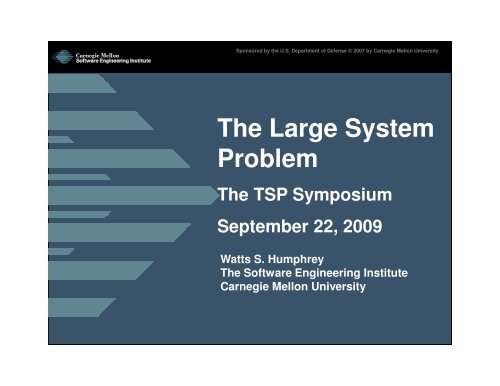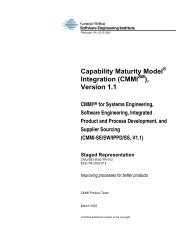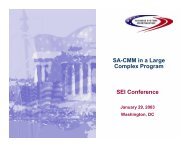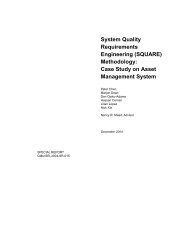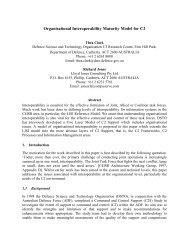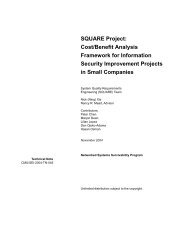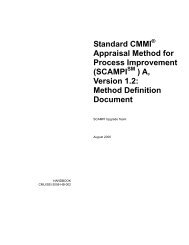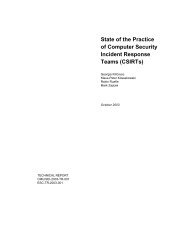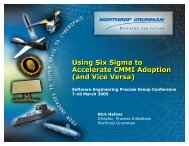The Large System Problem - Software Engineering Institute ...
The Large System Problem - Software Engineering Institute ...
The Large System Problem - Software Engineering Institute ...
You also want an ePaper? Increase the reach of your titles
YUMPU automatically turns print PDFs into web optimized ePapers that Google loves.
Sponsored by the U.S. Department of Defense © 2007 by Carnegie Mellon University<br />
<strong>The</strong> <strong>Large</strong> <strong>System</strong><br />
<strong>Problem</strong><br />
<strong>The</strong> TSP Symposium<br />
September 22, 2009<br />
Watts S. Humphrey<br />
<strong>The</strong> <strong>Software</strong> <strong>Engineering</strong> <strong>Institute</strong><br />
Carnegie Mellon University<br />
page 1
Why Can’t We Develop <strong>Large</strong> <strong>System</strong>s?<br />
<strong>Software</strong> development projects often fail.<br />
<strong>The</strong> larger they are, the more likely they are to fail.<br />
IT Project Success % vs. Cost<br />
Project Cost ($ Million)<br />
12<br />
8<br />
5<br />
1.25<br />
0.5<br />
2%<br />
6%<br />
12%<br />
19%<br />
61%<br />
0% 20% 40% 60% 80%<br />
% Success<br />
Adopted from the Standish Chaos Report - 2009<br />
© 2008 by Carnegie Mellon University<br />
Introduction 2
<strong>The</strong> FAA <strong>System</strong><br />
<strong>The</strong> FAA Advanced Automation <strong>System</strong><br />
• contracted to a CMM level-3 organization in 1989<br />
• contractor later appraised at CMMI level 5<br />
Costs<br />
• original cost estimate, 1989: $4.3 B<br />
• interim cost estimate, 1994: $6.9 B<br />
• when cancelled, total spent: $2.6 B<br />
Clearly, being CMMI level 5 does not solve the cost and<br />
schedule problems.<br />
© 2008 by Carnegie Mellon University<br />
Introduction 3
Other Examples<br />
<strong>The</strong> IRS system – finally started to use<br />
in 2005<br />
• 5 years of delays<br />
• costs exploded to $2 B<br />
FBI system killed<br />
• 3 years late<br />
• $150 M spent<br />
• 5 CIOs, 9 program managers<br />
Clearly, changing managers did not solve the FBI’s problems.<br />
© 2008 by Carnegie Mellon University<br />
Introduction 4
This Is a Major <strong>Problem</strong><br />
A GAO study of 72 weapons programs<br />
• Projected costs up by 26%<br />
• Development costs up by 40%<br />
<strong>The</strong> New York Times<br />
• Two thirds of largest weapons over budget last year<br />
• Total extra cost: $296 B<br />
• Programs averaged 2 years behind schedule<br />
© 2008 by Carnegie Mellon University<br />
Introduction 5
Finding a Better Way<br />
For the last 25 years we have tried changing<br />
• managers<br />
• acquisition strategies and regulations<br />
• incentive systems<br />
• auditing procedures<br />
None of these changes has fixed the problem.<br />
<strong>The</strong>re must be a better way!<br />
© 2008 by Carnegie Mellon University<br />
Introduction 6
T h e P r o b l e m<br />
Development work has changed in the last 50 years.<br />
Project management methods have not.<br />
In the past, development work concerned things.<br />
• We produced items one could touch and feel.<br />
• <strong>The</strong> managers could understand the work by watching it.<br />
<strong>The</strong>se older methods were designed for supervising factory<br />
workers.<br />
© 2008 by Carnegie Mellon University<br />
Introduction 7
Traditional Management<br />
<strong>The</strong>se management methods<br />
were defined by Frederick<br />
Winslow Taylor 100 years ago.<br />
<strong>The</strong>y were designed for<br />
• largely uneducated workers<br />
• relatively simple manual labor<br />
Even though the work and<br />
workers have changed, Taylor’s<br />
methods are still used.<br />
© 2008 by Carnegie Mellon University<br />
Introduction 8
Taylor’s Management Principles<br />
Taylor’s methods rest on three<br />
principles.<br />
1. Management knows the best<br />
way to do the job.<br />
2. <strong>The</strong> managers can monitor the<br />
work by watching it.<br />
3. <strong>The</strong> workers cannot be trusted to do good work unless<br />
they are watched.<br />
© 2008 by Carnegie Mellon University<br />
Introduction 9
Knowledge Work<br />
Traditional management methods do<br />
not work for software because it is<br />
knowledge work.<br />
Drucker’s definition of knowledge work.<br />
• It involves concepts, ideas, designs.<br />
• It is done in the workers’ heads or on<br />
computers.<br />
• <strong>The</strong> workers often know more about<br />
the work than their managers.<br />
Knowledge work cannot be tracked and managed by<br />
just watching it.<br />
© 2008 by Carnegie Mellon University<br />
Introduction 10
T r a d i t i o n a l l y M a n a g i n g S o f t w a r e<br />
With Taylor’s methods, the manager’s job is to<br />
• define the job<br />
• plan the work<br />
• tell the workers how to do their jobs<br />
• monitor their performance<br />
• correct them when they do something wrong<br />
With these methods, the workers and managers have different<br />
objectives.<br />
• <strong>The</strong> managers want the maximum amount of work for the<br />
least cost.<br />
• <strong>The</strong> workers want maximum pay for the least amount of<br />
work.<br />
© 2008 by Carnegie Mellon University<br />
Introduction 11
Observations on Knowledge Work<br />
Knowledge work does not fit the principles for Taylor’s<br />
methods.<br />
With Taylor’s methods, the knowledge workers and<br />
managers have different views of project success.<br />
• <strong>The</strong> workers view projects as successful if they were<br />
technically interesting and rewarding.<br />
• <strong>The</strong> managers view projects as successful if they met their<br />
cost and schedule targets.<br />
Since groups rarely succeed when members and managers<br />
work to different objectives, software projects keep failing.<br />
It is also why large systems programs are unmanageable<br />
with today’s management methods.<br />
© 2008 by Carnegie Mellon University<br />
Introduction 12
<strong>The</strong> <strong>Large</strong> Project <strong>Problem</strong><br />
<strong>Large</strong> programs are typically composed of multiple small<br />
projects.<br />
<strong>The</strong> small projects can usually be managed with informal and<br />
unmeasured methods.<br />
When large programs are managed informally, they typically<br />
fail because of<br />
• unanticipated problems<br />
• unmet interdependencies<br />
• the blame culture<br />
© 2008 by Carnegie Mellon University<br />
Introduction 13
Unanticipated <strong>Problem</strong>s<br />
Fred Brooks best described the<br />
software management problem.<br />
“Schedules slip a day at a time.”<br />
To do his or her job, the manager<br />
must<br />
• know job status<br />
• recover from the daily schedule<br />
slips every day<br />
• keep management informed<br />
© 2008 by Carnegie Mellon University<br />
Introduction 14
Anticipating <strong>Problem</strong>s<br />
To anticipate project problems, the managers must ask the<br />
knowledge workers who<br />
• have no measures of job status<br />
• see schedule management as the manager’s job<br />
<strong>The</strong>y typically make vague statements like<br />
• “I’m 90% through coding.”<br />
• “Just a couple more bugs and I will finish testing.”<br />
As a result, the manager<br />
• does not know job status<br />
• cannot anticipate problems<br />
• cannot correct problems before they are big enough to<br />
see<br />
© 2008 by Carnegie Mellon University<br />
Introduction 15
Unmet Dependencies<br />
In large programs, all the parts must come together to produce<br />
a complete operational system.<br />
To meet the overall program schedule, every part of the<br />
program must meet its dependency commitments.<br />
Any delay in any part of the work can distort the entire<br />
dependency network.<br />
Effectively managing this web of interdependencies is essential<br />
for program success.<br />
© 2008 by Carnegie Mellon University<br />
Introduction 16
Managing Program Dependencies<br />
To manage the interdependencies among all the parts of a<br />
large program, the team managers<br />
• must know their team’s status<br />
• anticipate problems in other teams<br />
• warn other teams of commitment delays<br />
• update plans for program changes<br />
• dynamically negotiate and rebalance team commitments<br />
This dependency management process requires<br />
• accurate status information<br />
• timely problem identification<br />
• a dynamic and cooperative replanning process<br />
© 2008 by Carnegie Mellon University<br />
Introduction 17
<strong>The</strong> Blame Culture<br />
In today’s blame-based culture, nobody wants to speak up.<br />
• <strong>The</strong> knowledge workers first sense trouble.<br />
• <strong>The</strong>y see the schedule as a management problem and are<br />
reluctant to get involved.<br />
• Eventually, the problems are serious enough for the<br />
managers to see.<br />
• By then, many parts of the program are in schedule trouble.<br />
• No lower-level manager wants to be first to admit to<br />
problems.<br />
• Finally, the cost and schedule problems are so serious that<br />
someone must speak up.<br />
At this point, the cost and schedule commitments are<br />
unrecoverable and everybody upstairs is surprised.<br />
© 2008 by Carnegie Mellon University<br />
Introduction 18
<strong>Large</strong> <strong>System</strong> Management<br />
<strong>The</strong> first step in managing large systems programs is to<br />
recognize that these programs involve knowledge work.<br />
<strong>The</strong> second step is to adopt a fact-based knowledge-working<br />
process like the Team <strong>Software</strong> Process (TSP) SM<br />
.<br />
<strong>The</strong> third is to involve the knowledge working teams in<br />
managing their own work.<br />
Finally, management must support and coach the teams when<br />
they need help.<br />
SM<br />
Team <strong>Software</strong> Process and TSP are service marks of Carnegie Mellon University.<br />
© 2008 by Carnegie Mellon University<br />
Introduction 19
Managing Knowledge Work -1<br />
<strong>The</strong> four principles of knowledge<br />
management<br />
• Only the workers understand the<br />
work.<br />
• Knowledge workers must manage<br />
themselves.<br />
• <strong>The</strong> workers must be trusted to<br />
manage their work.<br />
• Knowledge workers need leadership<br />
and coaching.<br />
© 2008 by Carnegie Mellon University<br />
Introduction 20
Responsible Project Behavior<br />
When following a knowledge-working process like the TSP, the<br />
knowledge workers<br />
• still seek interesting and rewarding work<br />
• continue to value a rewarding team environment<br />
• feel responsible for project cost, schedule, and quality<br />
performance<br />
In doing their jobs, TSP teams<br />
• plan, track, and manage their own work<br />
• measure schedule and quality performance<br />
• promptly identify schedule slips<br />
• strive to meet all their commitments<br />
• provide early warning when they cannot<br />
© 2008 by Carnegie Mellon University<br />
Introduction 21
<strong>Large</strong> Project Consequences<br />
When the project’s knowledge-working teams know their status<br />
• they promptly seek help when they need it<br />
• their managers have the facts and data to help them<br />
• a fact-based attitude fosters cooperation across the program<br />
<strong>The</strong> teams, their managers, and the customers can then<br />
• identify problems in time to resolve them<br />
• work cooperatively to make the program successful<br />
© 2008 by Carnegie Mellon University<br />
Introduction 22
Conclusion<br />
Today, large system programs<br />
• almost never meet their cost and schedule commitments<br />
• are often expensive failures<br />
A key reason is an outdated and inefficient management<br />
system.<br />
A knowledge-working process like the TSP would enable<br />
• objective fact-based management<br />
• a cooperative working environment<br />
• consistently successful programs<br />
© 2008 by Carnegie Mellon University<br />
Introduction 23
For More Information<br />
Visit the TSP web site: http://www.sei.cmu.edu/tsp/<br />
Contact a PSP transition partner<br />
http://www.sei.cmu.edu/collaborating/partners/trans.part.psp.html<br />
Contact SEI customer relations<br />
<strong>Software</strong> <strong>Engineering</strong> <strong>Institute</strong>, Carnegie Mellon University<br />
Pittsburgh, PA 15213-3890<br />
Phone, voice mail, and on-demand FAX: 412/268-5800<br />
E-mail: customer-relations@sei.cmu.edu<br />
Read the book<br />
Winning With <strong>Software</strong>: an Executive Strategy, by Watts<br />
Humphrey, Addison-Wesley, 2002<br />
© 2008 by Carnegie Mellon University<br />
Introduction 24


